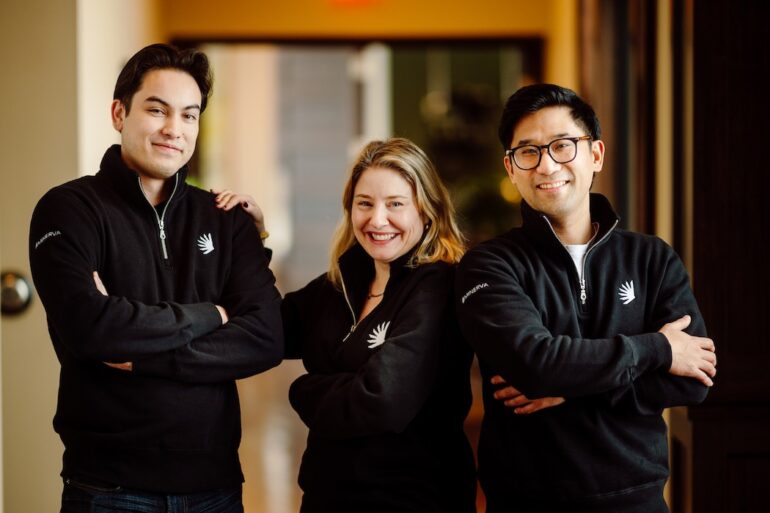In Canada, intelligence agencies estimate between $45 billion and $113 billion is laundered each year. These funds can be used for a number of illicit activities ranging from gambling and embezzlement to human trafficking.
Financial institutions (FIs) are tasked with repeatedly assessing their clients’ risk profiles to block dirty money from passing through legitimate financial systems. But as Jennifer Arnold saw during her time in the banking sector, finding bad actors is easier said than done.
“For a long time in banking, it was like these two agendas were pulled apart; you can be efficient or you could be effective, but you couldn’t be both. I think that’s nonsense.”
Jennifer Arnold
Assessing the risk of just one client can take an entire day because of how slow and manual the process is. This problem is what prompted Arnold and co-founders, COO Victor Tay and CTO Damian Tran, to build Minerva, an anti-money laundering (AML) software platform that uses artificial intelligence (AI) to help FIs proactively identify client risk from onboarding to exit.
“By getting them to move more quickly to be able to understand their risk, something closer to real time, we actually have a real shot at disrupting this flow of [illicit] funds,” Arnold, Minerva’s CEO, told BetaKit in an interview.
While Toronto-based Minerva got its start serving cryptocurrency companies, the startup is setting its sights on larger FIs to help compliance teams get ahead of financial crime. After raising two funding rounds and bringing Equifax Canada on board as a partner, Arnold believes the startup is well on its way toward achieving that mission.
Meeting of the minds
Arnold and Tay both have roots in traditional finance. Their paths first crossed at the Bank of Montreal, where they collaborated on the deployment of a transaction monitoring system designed for AML and financial crime compliance. It was there that the pair identified some of the challenges present in financial risk management teams.
“It kind of just confused me that the process that they had to go through in order to complete the work was so incredibly laborious and manual,” Arnold said.
During the typical risk management processes, investigators sift through a client’s information across up to 10 different vendor solutions. This not only results in an overwhelming number of false positives but also necessitates an extensive collection of more data. This data, which is compiled manually by investigators, usually ends up pasted into a basic Word document.
“They read their way through trying to understand: Is this actually my client? Is there risk in this profile? If so, what is the nature of that risk? And is this a risk my organization would or would not accept?” Arnold said.
In total, the process for each client can take up to eight hours, Arnold said, and for this reason, financial service providers often find themselves falling behind that flow of work, simply because they do not have enough capacity to trawl through all the data fast enough.
Tay and Arnold saw teams face the same obstacles when they transitioned to other banks. Arnold observed a common thread was that each bank had “a large group of people who really want to do good in the world, who were not given the tools or the resources to do so.”
It was over beers and pizza that Arnold and Tay met their third co-founder, Tran, who was at the time building AI-based investigation tools for cancer researchers.
“He immediately saw the similarities and the complexities of the problem from what he was doing in his day job then to what we were proposing,” Arnold said.
Tran came on board in 2018, and the trio quietly began building Minerva’s platform in 2020. Arnold said the team’s proposal to FIs is that investigators’ time is better spent on the risk assessment and risk decision-making portion of a case, rather than the data collection and synthesis.

Minerva is designed to do all this legwork for investigators, from the moment they receive a case. The platform collects, aggregates, and analyzes all of the relevant data points to create a client risk profile.
Minerva’s platform examines data from a very wide range of publicly available sources. This includes sanctions lists, publicly available employment records, court listeners, public-facing social media, business databases, and over 300,000 media sources in nearly 150 languages, which are ranked for credibility.
Arnold stated that throughout the development process, the key enhancements to the product have been in its accuracy and speed. She claimed Minerva is now 99.8 percent accurate in compiling profiles. In the platform’s initial development, profiles could be generated in three minutes. Now, Arnold said it takes less than 20 seconds.
“Now, that six, seven, eight-hour case really could take maybe a maximum of an hour, if that,” Arnold added.
Curious crypto bros
Once Minerva was built, the next stage for the startup was bringing it to market. While the platform was originally designed for Tier 1 FIs, the co-founders quickly realized that a party of three selling an early-stage risk product to major FIs was “not tenable.”
Shortly after securing $2.6 million CAD ($2 million USD) in seed funding led by Fika Ventures in the spring of 2021, Minerva secured its first customer, who Arnold said was not necessarily the startup’s ideal customer profile, but still “a great partner.” In 2022, the company began nabbing larger customers, including Binance Canada, Coinbase, and Mogo.
While not Minerva’s original target market, Arnold said the crypto segment ended up being “a really good fit for us for a ton of reasons. They were curious, they love technology, they’re not afraid of trying something new, running it against what they’ve already got in house, and doing a real champion-challenger comparison,” she added.
RELATED: Australian government taps Bedrock AI for RegTech challenge
Last year was a significant one for Minerva, but it started with a big hiccup. In May 2023, one of its largest customers, Binance, pulled out of the Canadian market amid mounting regulatory pressure. “That was a huge chunk of our business,” Arnold said. “So last year was really about diversification and making up that lost revenue.”
Those efforts appear to have proven fruitful. In 2023, Arnold said Minerva managed to double its customers to 24, mostly based in the United States. The startup also closed a $12-million CAD ($9 million USD) Series A round led by New York-based FirstMark, which has also invested in Ada, HyperComply, and Shopify.
Minerva remains focused on traditional finance, and this year the company launched a channel partner program aimed to provide organizations and their customers with access to its AML risk assessment solutions.
The program’s first announced partner is a big one: Equifax Canada. Though it is best known as a consumer credit reporting agency, Equifax also offers a variety of products and services to FIs, companies, employers, and government agencies. Carl Davies, head of Equifax Canada’s fraud and identity division, told BetaKit that the partnership will allow Equifax Canada’s customers to use Minerva’s AML platform.
“Equifax has managed a fraud consortium for well over a decade where we can see applications that have been marked as suspicious by various FIs, autolenders, telcos, etcetera,” he said. ”Minerva comes from an area of AML, so bringing those two things together really will help drive fraud prevention in Canada.”
Fighting multiple wars on one front
While it may seem like Minerva’s main goal is to save time and reduce costs for FIs, the team is actually aiming for something bigger.
Financial crime is often perceived as a white-collar issue with minimal direct harm, yet money laundering underpins and facilitates a wide range of serious crimes, including terrorism, human and drug trafficking, and wildlife poaching.
Arnold described money laundering as the “big umbrella” under which bad actors can move illicit funds through legitimate systems.
She sees Minerva as a startup with two agendas. “My love letter to the investigators is, ‘here’s a platform that is going to help you spend the balance of your time thinking and assessing risk instead of doing this manual and menial work,’” she said.
But by getting FIs to move more quickly, Minerva is looking to fulfill its broader and much more ambitious goal: to help put an end to money laundering, and all of the other kinds of crime it enables.
“I think for a long time in banking, it was like these two agendas were pulled apart; you can be efficient or you could be effective, but you couldn’t be both,” Arnold said. “I think that’s nonsense.”
Feature image courtesy Minerva AI.


